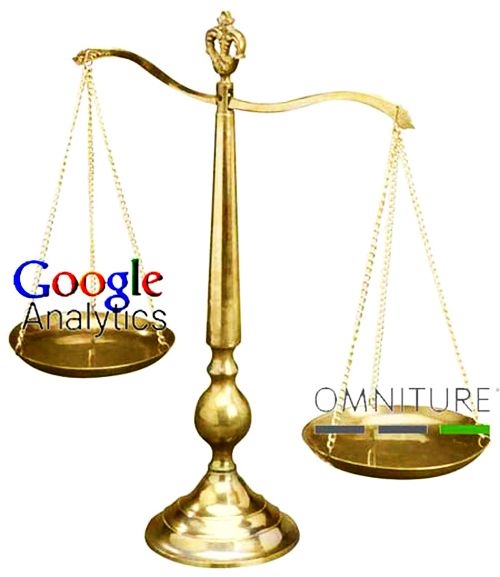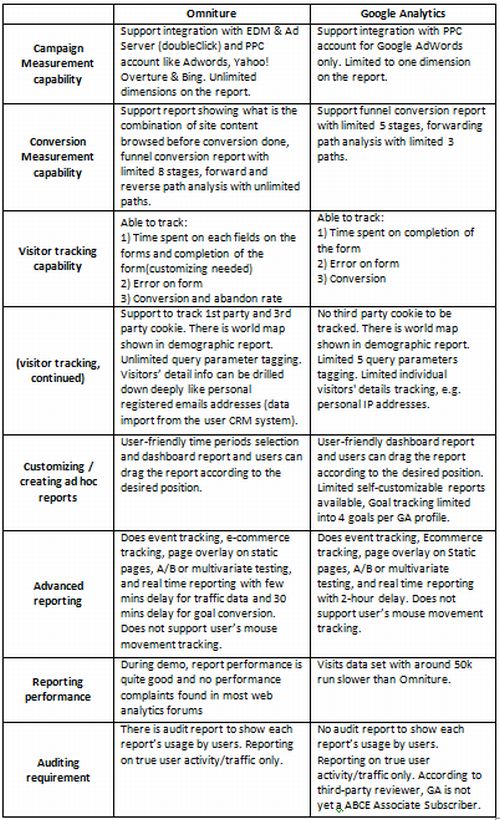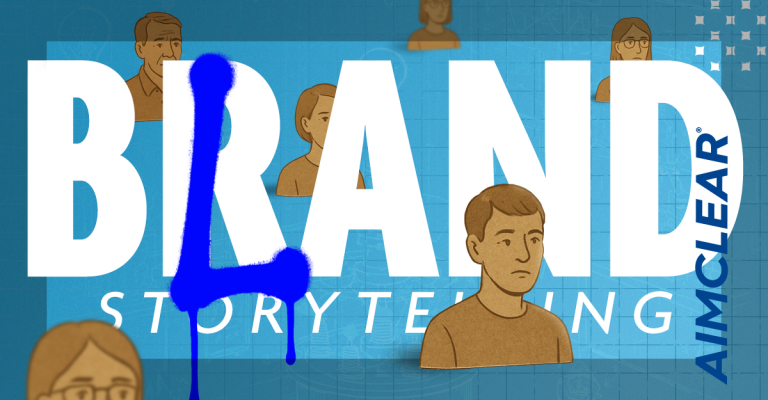 [This is a guest post written by Dennis Yu, CEO of BlitzLocal.] We get asked the “GA or Omniture” question often enough that we decided to offer up this analysis as a buyer’s guide to the marketing executive or CEO. So how well does a free product stack up against one costing six figures?
[This is a guest post written by Dennis Yu, CEO of BlitzLocal.] We get asked the “GA or Omniture” question often enough that we decided to offer up this analysis as a buyer’s guide to the marketing executive or CEO. So how well does a free product stack up against one costing six figures?
The main selling points of Omniture are engine-independence and paid support. Conceptually, there is something to be said about using a third-party tool to manage your spend across multiple engines. At the same time, the primary engines have formats (API and bulk loading) that make it easy to export and import campaigns.
In this regard, the gap that used to be there a couple years ago is now closed– and then there are cheap tools like SpeedPPC that quickly multiply and distribute campaigns across multiple engines. Omniture’s SearchCenter integration with the platform is in marketing only– true product integration is a long ways off and not likely, given that it’s already been a couple years in the making (data warehouse export is still not working), and that Adobe bought Omniture.
- Google Analytics doesn’t offer paid support. While there are a few GAC consultants that Google authorizes (they have to pass a test for certification– harder than the AdWords qualification), and there are some PPC/Analytics training sessions sponsored by Google– there is definitely not the kind of support/consulting you get from buying software. Many corporations prefer the idea of paid software and are comfortable with that model of having an account manager they can call up with questions, plus a block of services hours for implementation and report development. That said, you might ask Omniture about their support offering and ask a few clients that are peers of Global Sources to inquire about the support they get.
- Campaign reporting. GA allows for multiple dimensions– in particular, motion charts, advanced segments, and the various multi-dimensional views that are metric specific. I believe Omniture is inferior in this regard because of GA’s ability to visualize data in cross-tab (pivot) and related view formats. In other words, it’s easier to uncover trends in GA than by hunting through Omniture.
- Integration. This is usually a red herring across most Internet marketing companies. The most important integration in analytics and PPC software is that of CRM interaction (salesforce.com, Eloqua, Microsoft Dynamics, SugarCRM, etc..) and offline conversions. This almost always requires some custom work, since every company has a different underlying data model (which they should), as well as a different sales funnel and attribution scheme. The collection, integration, and weighting of this data is not an out-of-the-box software module, but an exercise of sophisticated marketing analytics. Online conversion tracking is relatively simple for all enterprise-level analytics tools, whether using a method like Google URL Builder or cookie tracking. Google has a significant advantage in tracking activity from and on Facebook, despite the marketing efforts put forth by Omniture.
- Funnel tracking. Omniture does allow for multiple paths. Our viewpoint is that the more sophisticated method is to measure event-level attribution (page or click), rather than force the analyst (you) to have to define each particular path to analyze. The traditional methods of slice-and-dice is a needle in a haystack approach — you should prefer your analytics tool to do the legwork to tell you what combinations of pages lead to a conversion or a poor user experience. We are not aware of any clickstream analytics tool that does this out of the box. With the number of combinations of attributes events, and pages possible, you need click level data and a correlation algorithm to pull out the right combination of trends to view. You cannot do this out of GA yourself, because you’ll need the raw data to calculate. That said, log file parsing is probably the most practical solution here if you want to go that far in analytics, given that Omniture doesn’t know how to do it (we’ve had multiple calls with their top people and they are stumped).
- User tagging. Omniture does allow for more variables to be stored. You’ll want to consider what use cases you have that cannot be solved via an advanced segment and parsing urls. If you’re interested in Omniture’s solution, please read the chapter in their implementation guide — it’s a confusing read, but they do allow collection of personal data. Google doesn’t allow collection of such data for privacy reasons. Not sure about auditing requirements — any certification of data accuracy would have to rely upon click-level data out of your logs, which Google can’t do (unless you have the old urchin, which is not recommended).
- Goal tracking. Google has recently expanded from 4 goals to 20 goals. Most companies misuse goal-setting, as they confuse segments and points within the funnel as goals. The more goals you have, the more complex the attribution. It’s hard enough to do attribution when you have only 1 goal and many events for which you have to allocate credit — now try matrix attribution with many goals and many events. To the best of our knowledge, almost nobody has single goal attribution down, so matrix attribution is not even in the vernacular of analytics yet.
- Page overlays. Cool tool with wow factors for both GA and Omniture– but usually not usable because of tracking problems and multiple links on a page that have the same URL. On the latter, let’s say that on a particular page, there are two links to get to another page (a topnav and a footer nav link)– if they have the same destination url, you won’t be able to tell which one drove the click. We have rarely found the visual overlays to offer accurate data.
- Data freshness. Generally a 2-10 hour delay on Google. Data freshness is most important is when you have events that require real-time optimization. Keep in mind that PPC data may be on a full day lag and you’re limited by your weakest link. Thus, if your web analytics is only 30 minutes behind, but your PPC and CRM are 4 hours behind, you’re really 4 hours behind (or you’re making inaccurate decisions). Further, the concept of statistical significance is such that you have to gather enough data to determine what’s going on. At Yahoo!, we decided that a 3 day reporting delay (because we needed 2.5 days to crunch attribution) was worth the trade-off in speed versus effective optimization. You’ll have to decide what data you really need at what frequency.
- Independence. Several of the government agencies we have talked to don’t use Google Analytics because open source is considered off-limits. Some major advertisers don’t use GA because of the potential conflict of interest in having your analytics being tracked with the place you spend your money. And there are the “tin foil hat” and anti-monopoly people that in general don’t believe you should have your analytics, PPC, landing page testing, mail, and so forth with the same company. Given practical realities, we don’t think this is an issue right now.
- Effectiveness. Google AdWords is going to have more effective (effective meaning increasing profits, as opposed to allowing you to create more reports) tools than 3rd party tools– they have to, because they have the advantage of more data. Case in point– the Conversion Optimizer of Google versus any bid management tools. With the exception of folks like ClickEquations (market leader who is good, but not great), in our opinion, nobody yet has a sophisticated method of bid management.
Omniture vs. Google Analytics comparison
Another potential plus for Omniture is that they’re releasing tools to manage Facebook PPC campaigns via their API.
Whether these tools are robust and take advantage of social targeting is yet to be seen, given that advertisers who blindly copy their PPC ads to Facebook don’t meet with success. They are also interacting with Facebook solely via the API, which is quite limited versus what’s available in the web interface or other third party tools that communicate by other methods.
Net-net, you can do mountains of comparison and research on web analytics tools. There is plenty to be said about the GA vs. Omniture debate. Our advice is to start from your goals and then decide, as opposed to what most people do, which is to create a wish list of every possible feature they might ever use and see who has the most checkboxes. That approach will lead you to the wrong solution, as most of the nice-to-have features you’ll never use.
The act of defining your goals, optimizations to directly improve such goals, and the reports to diagnose when you’ll take such optimizations is a re-statement of the process that BlitzLocal uses in running campaigns— that is metrics > analysis > action. If there are any metrics/reports that are not actionable, they are a waste of time. Metrics are about what has changed significantly since last time, analytics is about why, and action is what you’re going to do about it.
Dennis Yu is CEO of BlitzLocal, an Internet marketing firm specializing in Facebook and PPC campaigns. He is an international speaker and author.
Opinions expressed in the article are those of the guest author and not necessarily those of AIMCLEAR LLC or AIMCLEAR Blog.









